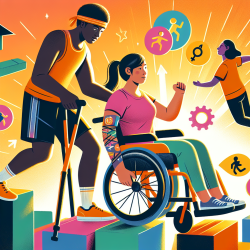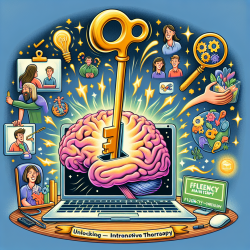Welcome to the World of Peer Mentorship for Spinal Cord Injury
Peer mentorship is a powerful tool that can significantly impact the lives of individuals living with spinal cord injury (SCI). A recent study, "Outcomes of peer mentorship for people living with spinal cord injury: perspectives from members of Canadian community-based SCI organizations," provides valuable insights into the outcomes of these programs. This blog will explore how practitioners can improve their skills by implementing the research findings or conducting further research.
Positive Outcomes for Mentees
The study identifies several positive outcomes for mentees involved in SCI peer mentorship programs. These include:
- Understanding: Mentees feel understood by someone who has experienced similar challenges.
- Emotional Support: The mentorship provides a psychological outlet and reduces feelings of loneliness and isolation.
- Inspiration and Hope: Mentees gain hope and inspiration from mentors who have successfully navigated life with SCI.
- Belonging: Mentees experience a sense of belonging to a community.
Positive Outcomes for Mentors
Mentors also benefit from participating in these programs. Positive outcomes for mentors include:
- Confidence and Pride: Mentors gain self-confidence and pride from helping others.
- Purpose: Mentoring provides a sense of purpose and fulfillment.
- Personal Growth: Mentors experience personal growth as they process their own emotions through helping others.
Reciprocity and Shared Learning
The study highlights the reciprocal nature of peer mentorship, where both mentors and mentees benefit from shared learning and problem-solving. This mutual exchange fosters a strong sense of community and collective benefit.
Challenges and Negative Outcomes
While the study emphasizes the positive aspects of peer mentorship, it also acknowledges potential challenges and negative outcomes, particularly for mentors. These include:
- Emotional Toll: The emotional commitment of mentoring can be taxing.
- Impact of Negativity: Mentors may need to manage negative influences from mentees.
- Time and Energy Demands: Mentoring requires significant time and energy investment.
Implementing Research Findings
Practitioners can enhance their skills by considering the study's findings. Here are some ways to implement the outcomes:
- Focus on matching mentors and mentees based on interests and lived experiences to foster stronger connections.
- Provide training for mentors to recognize and manage compassion fatigue.
- Develop evaluation tools to measure both positive and negative outcomes of peer mentorship programs.
Encouraging Further Research
The study underscores the need for further research to explore the complexities of peer mentorship in SCI contexts. Practitioners are encouraged to delve deeper into areas such as matching criteria, boundary setting, and the long-term impacts of mentorship.
To read the original research paper, please follow this link: Outcomes of peer mentorship for people living with spinal cord injury: perspectives from members of Canadian community-based SCI organizations.










